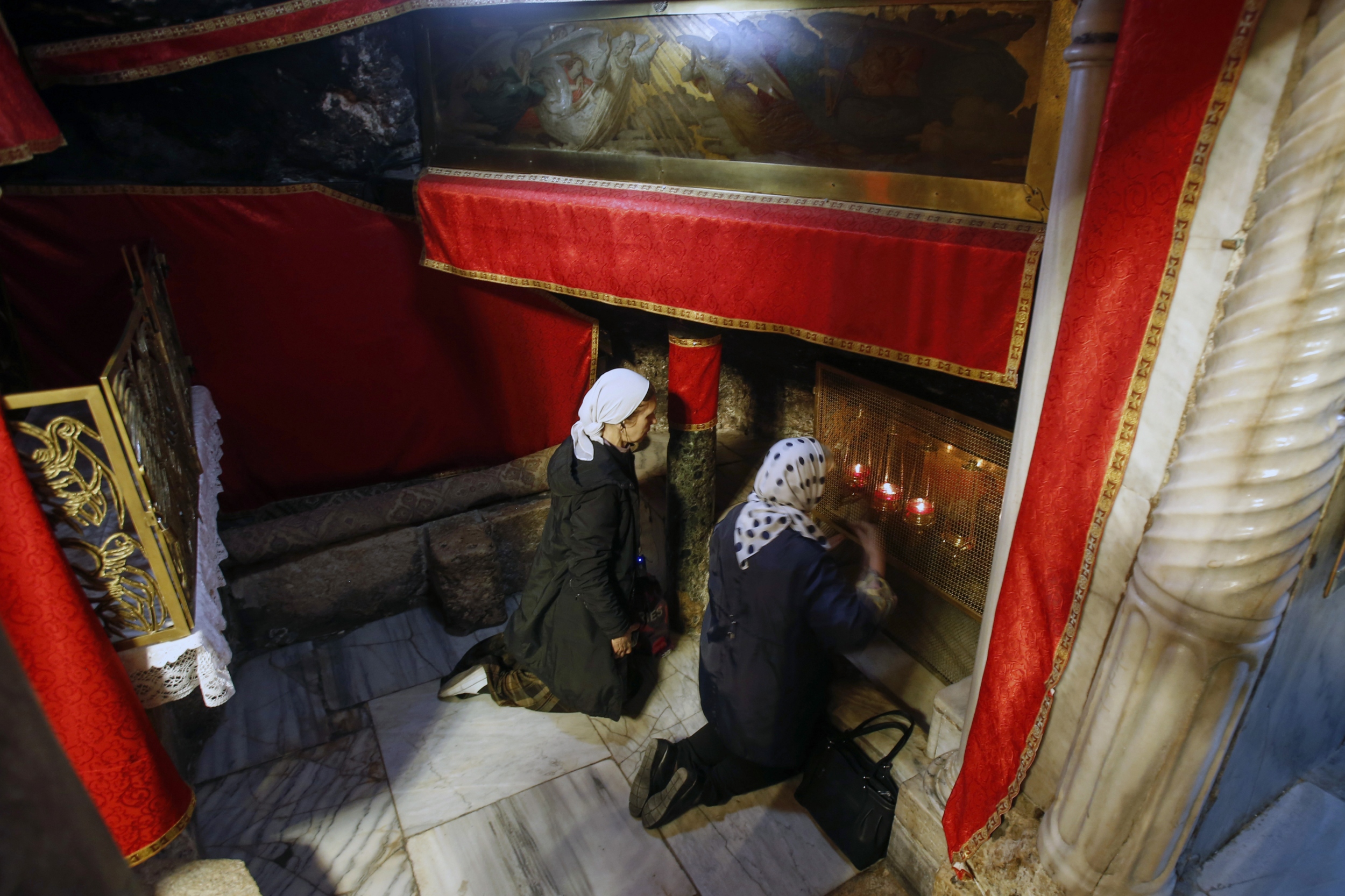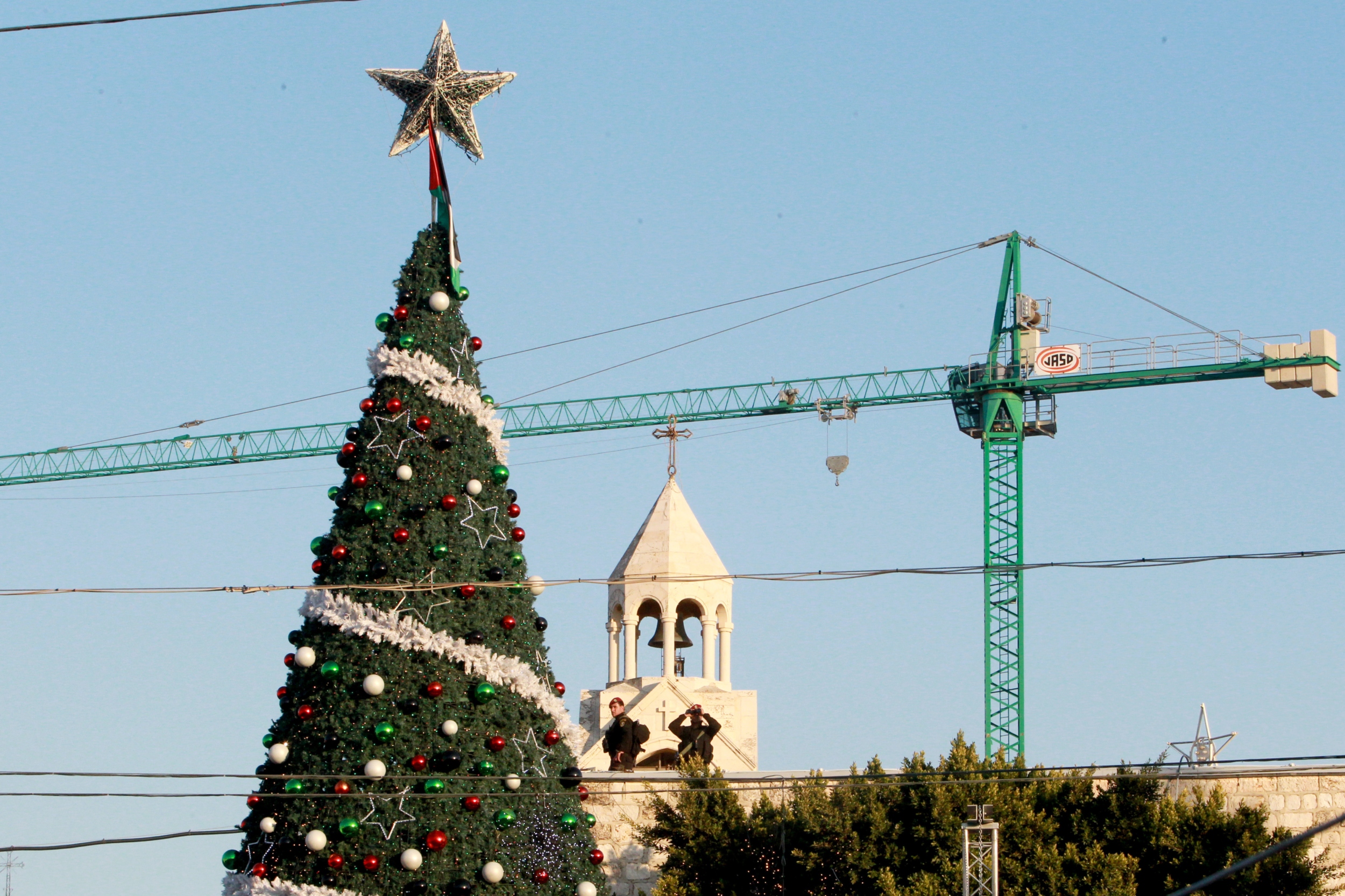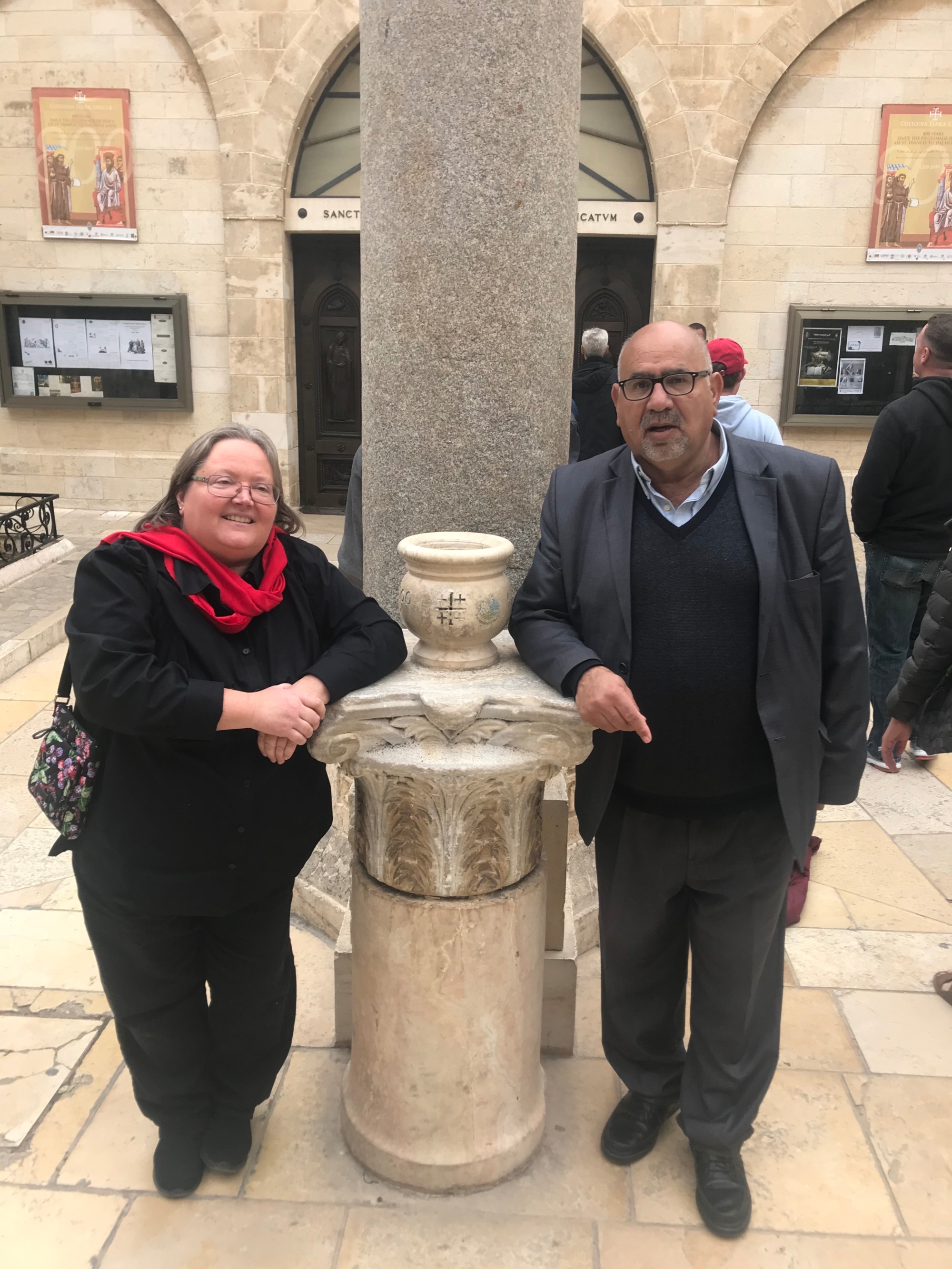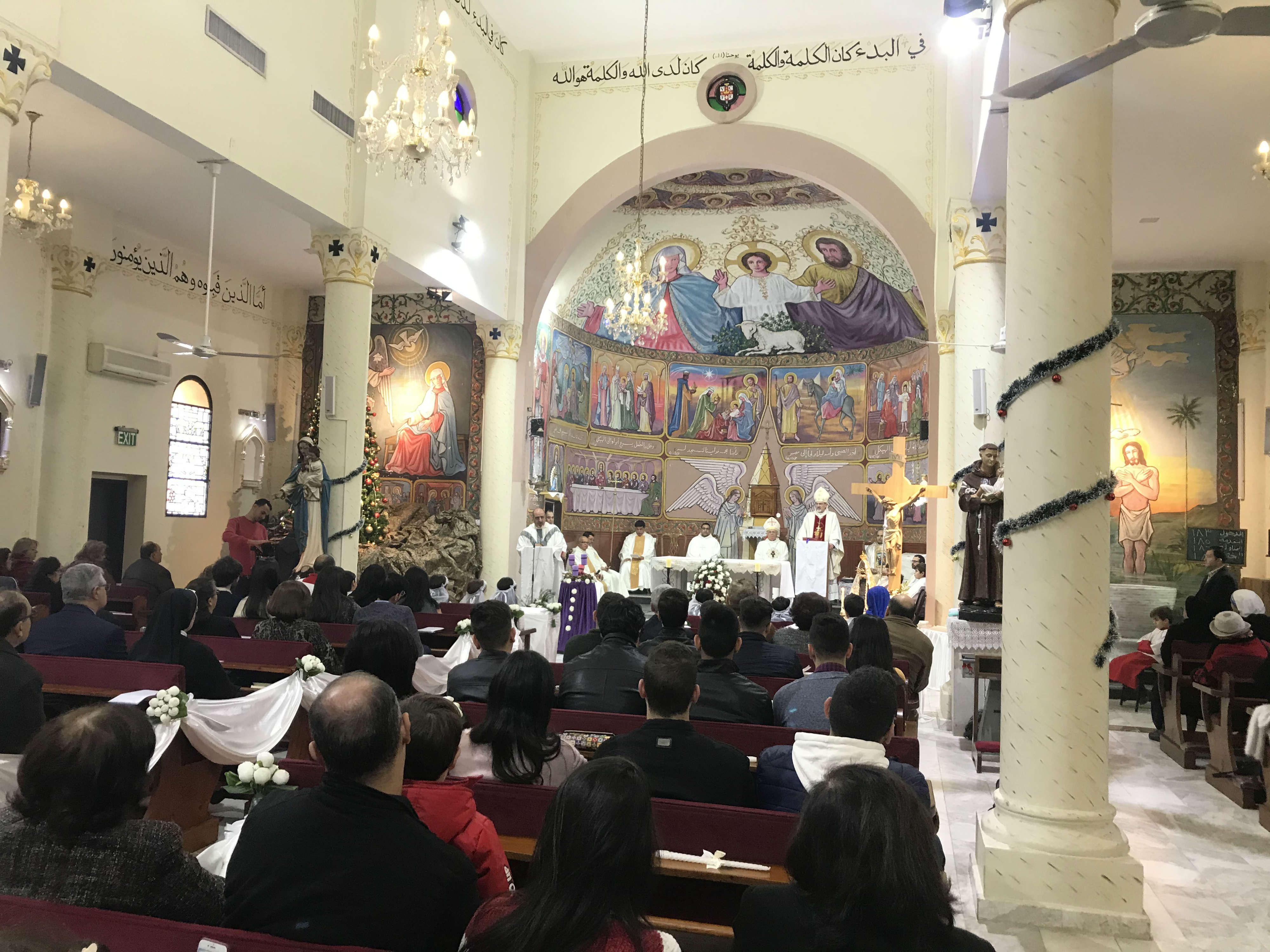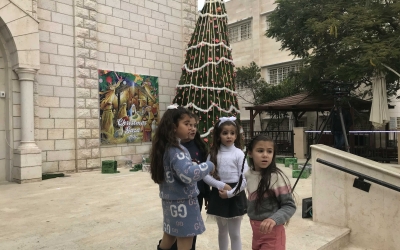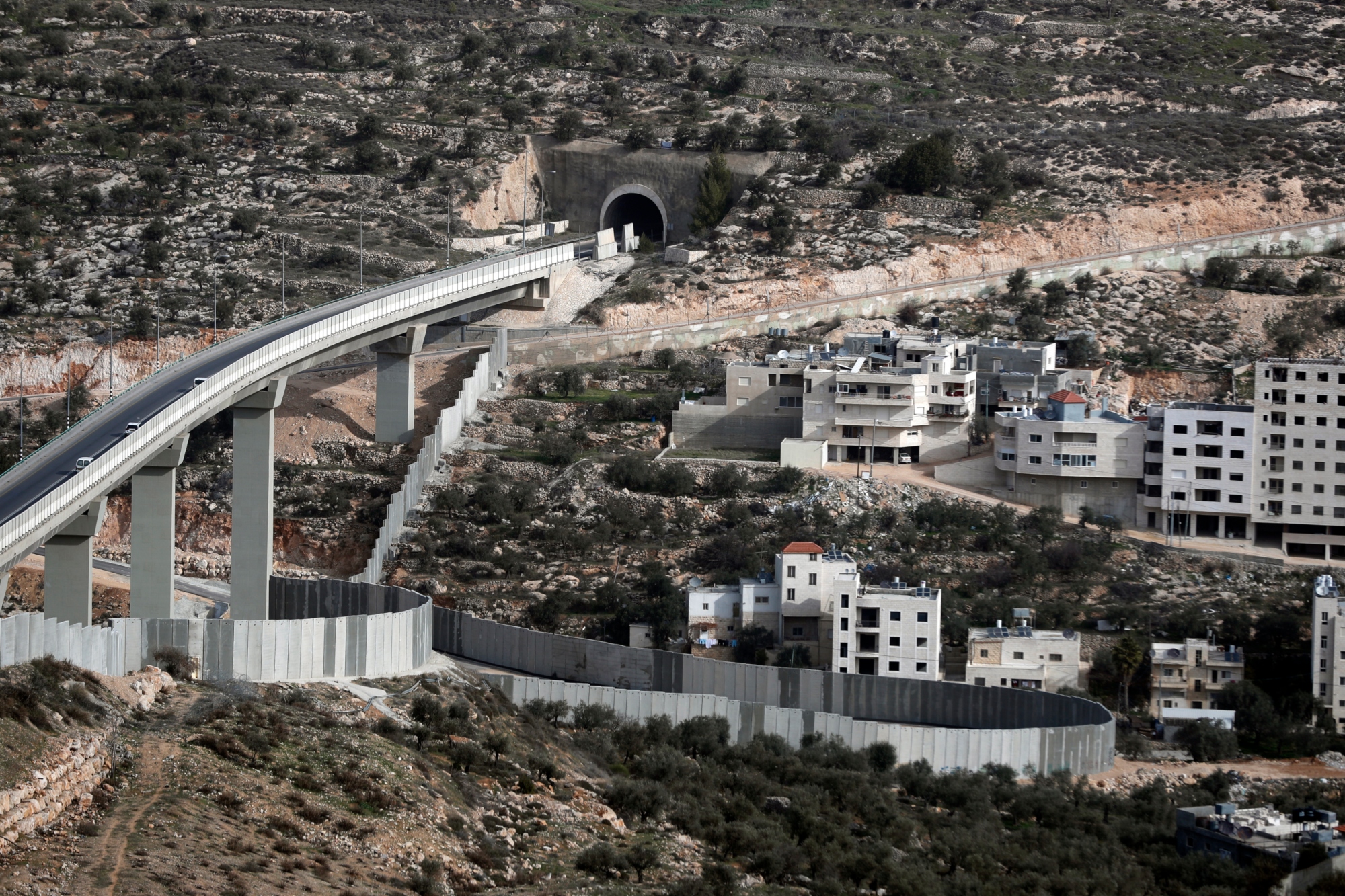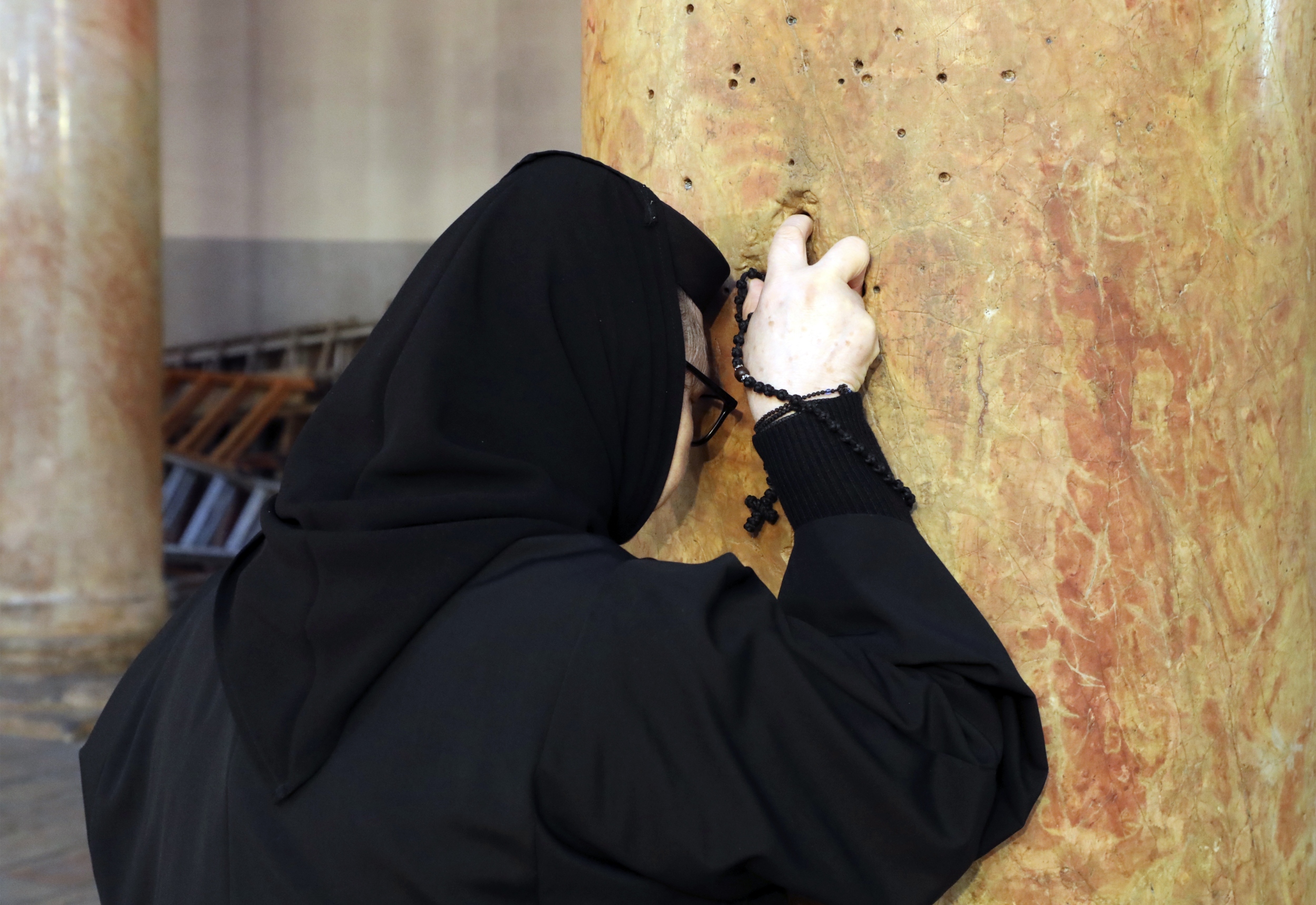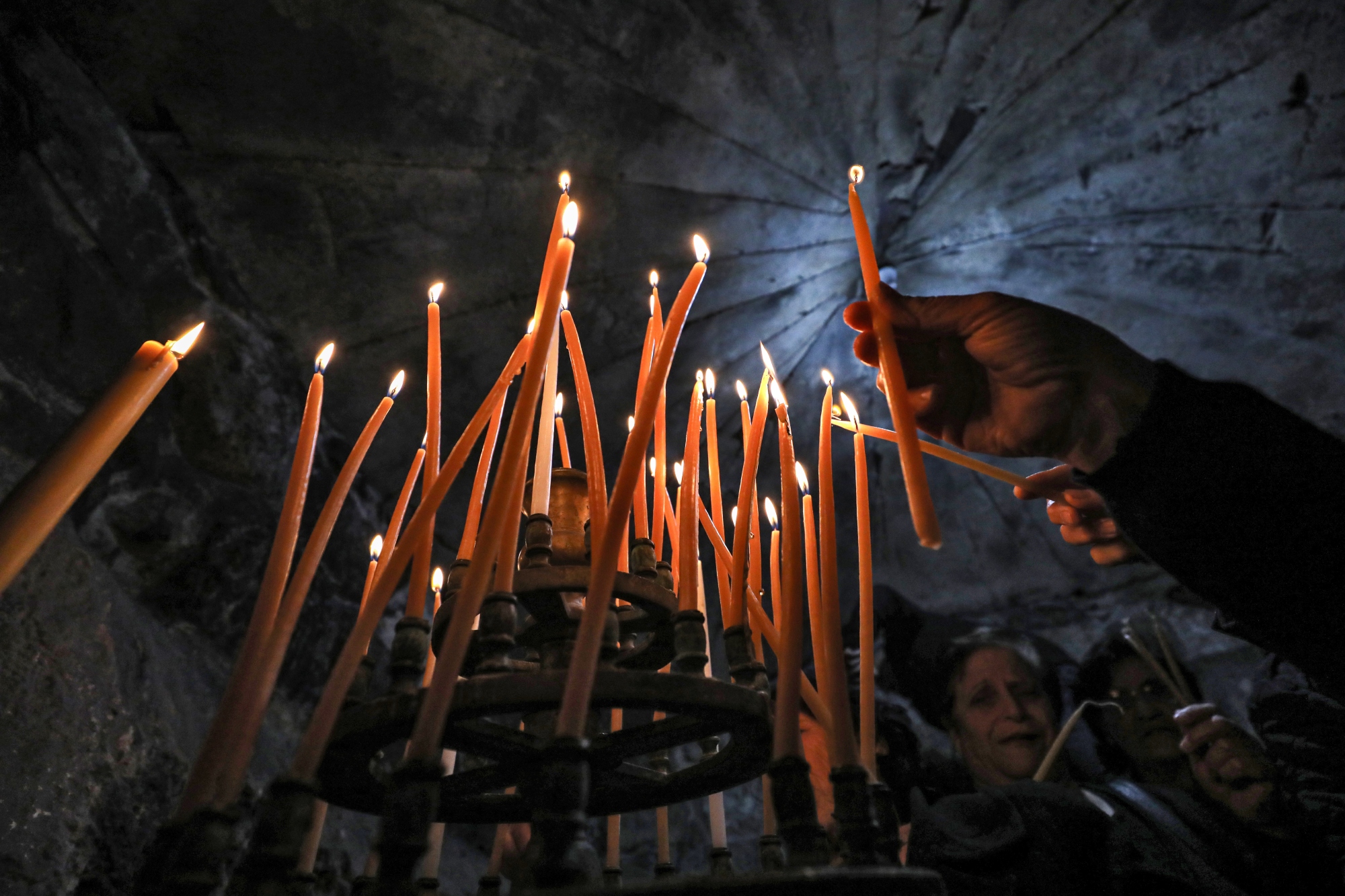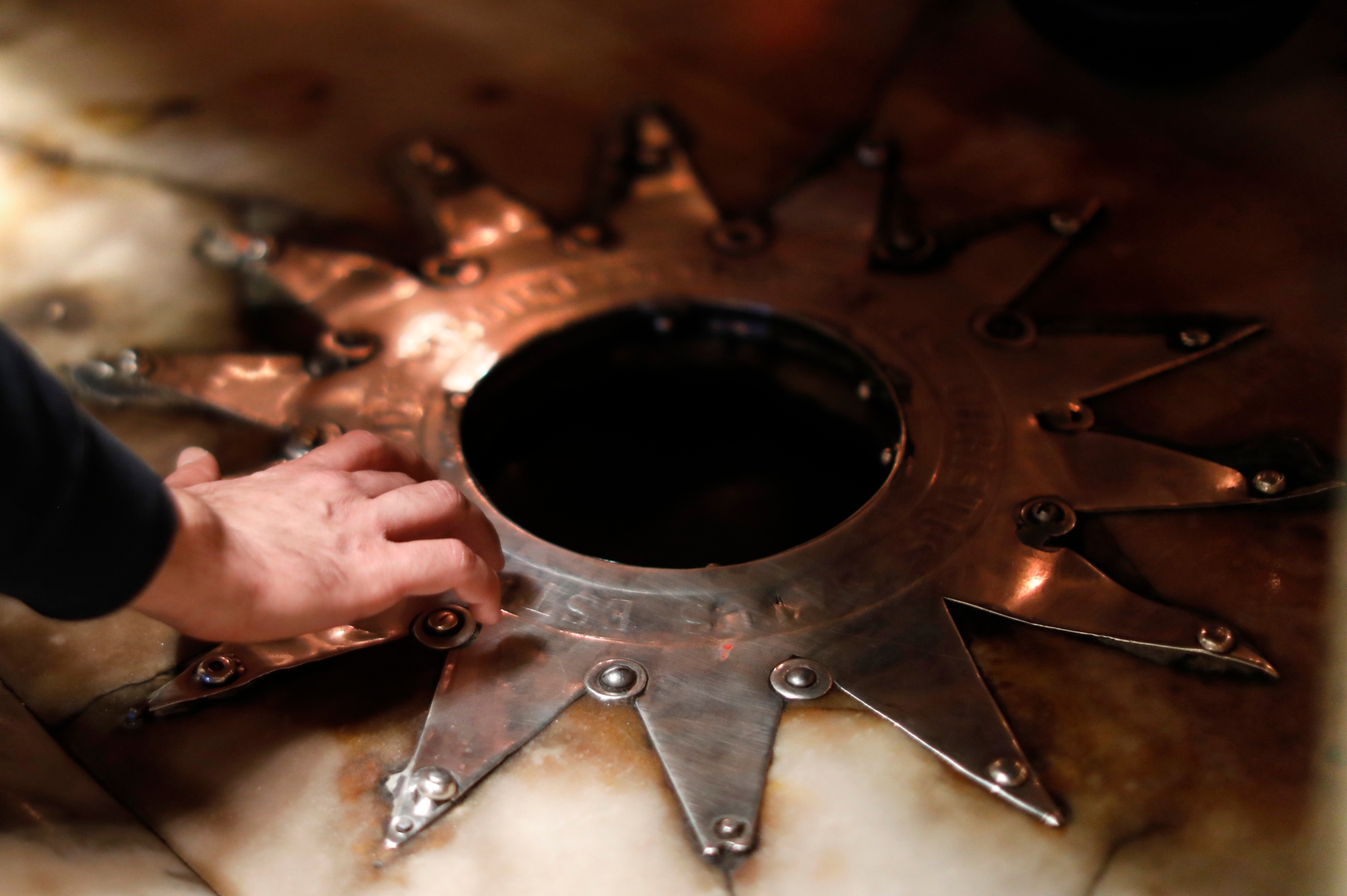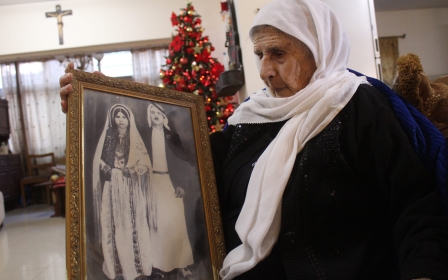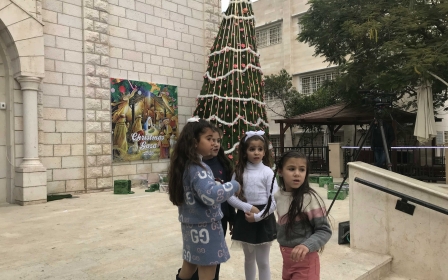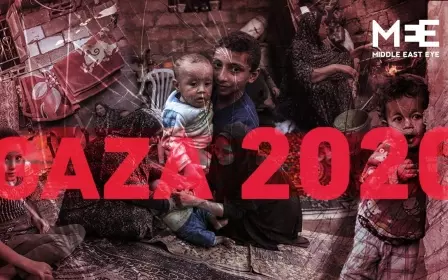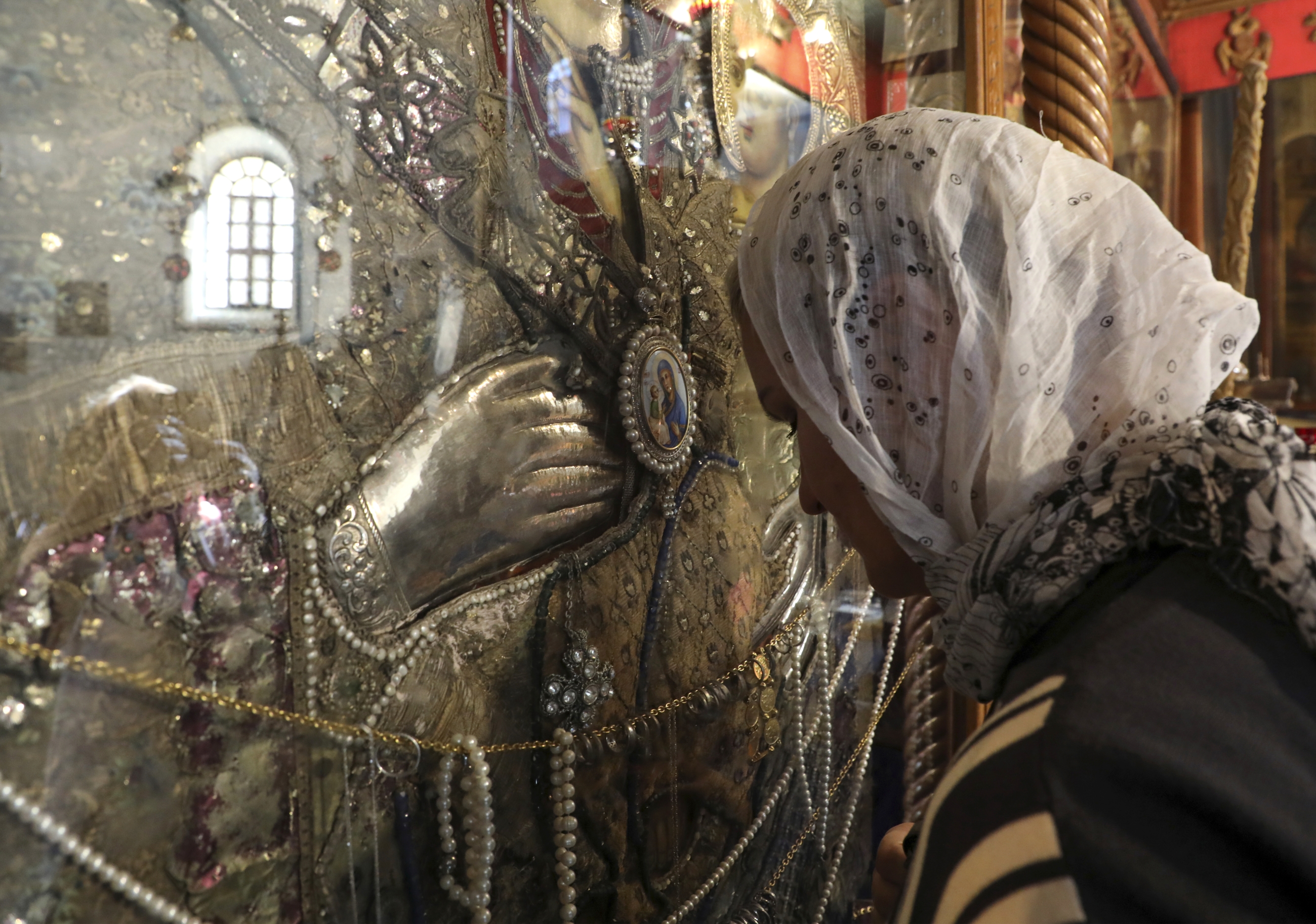
'The last generation': How occupation is driving Christians out of Palestine
One week before Christmas. I’m in Manger Square and watching pilgrims descend from buses and make their way to the Church of the Nativity, first built in the fourth century, on the spot where, according to Christian tradition, the infant Jesus was born.
Inside the church I join a party of Spanish pilgrims. We pause to sing carols by Jesus’s crib. There’s no doubting the sincerity or the devotion of those who make the pilgrimage to Bethlehem every year. For me, an Anglican Christian, it is a profoundly moving experience.
But how much do most of these pilgrims know about the small and embattled Palestinian Christian community which survives almost 2,000 years since the death of Jesus?
Located within the Israeli-occupied West Bank, modern Bethlehem is a hard place, with two refugee camps within the city’s limits and Israeli settlements constantly being developed round about.
The separation wall runs like a scar through the town. Every pilgrim must pass through it to reach Manger Square. Does it disturb them? Do they notice?
New MEE newsletter: Jerusalem Dispatch
Sign up to get the latest insights and analysis on Israel-Palestine, alongside Turkey Unpacked and other MEE newsletters
'For most tourists, it’s as if history stopped in 70 AD. They visit the Holy Land where Jesus performed his miracles, but they ignore the reality'
- Pastor Munther Isaac
Christianity here survived the persecution of its earliest converts under Roman rule. It flourished under the Byzantine empire, endured the early Islamic caliphates and enjoyed a revival under the Ottoman Empire before the territory of modern-day Palestine passed into British control in 1917.
Yet every Palestinian Christian I spoke to doubted whether there will soon be any significant Christian presence in the land where the founder of Christianity was born, preached his gospel and died.
With few exceptions they told me they were the last generation of Palestinian Christians.
A handful might be needed to look after the holy sites, above all the Church of the Holy Sepulchre in Jerusalem, which claims to be built upon both the site of Jesus’s crucifixion and the tomb from which he was resurrected, as well as the Church of the Nativity.
These holy places attract millions of pilgrims, incidentally making a fortune for the religious orders which control them. But these orders are based abroad and often staffed by foreign clergy, some of whom don’t speak Arabic.
Palestinian Christians distinguish between what they call the "dead stones", the shrines and churches that have left the mark of nearly 2,000 years of continuous Christian worship on the landscape, and the "living stones", the people who continue to practice the Christian faith in the birthplace of the religion. Here the facts are stark.
Their numbers are dwindling and today there are estimated to be just 40,000 Christians in the West Bank and only 11,000 in Jerusalem, according to figures published by the Latin Patriarchate Printing Press – barely one percent of the total population of the occupied Palestinian territories of the West Bank, Gaza and East Jerusalem.
According to a survey of Palestinian Christians living in Israel and the Palestinian territories, the percentage of the population that identified as Christian fell from 7.4 percent in 1947, before the creation of the state of Israel, to just two percent in 2007.
According to information published this week by Israel's Central Bureau of Statistics, there are 177,000 Christians living in Israel, or about two percent of the total population of the country.
To understand this mortal threat, I visited Gaza, Jerusalem, the West Bank and Israel itself over two trips, one last summer and the other during the run up to Christmas.
In Bethlehem, rather than pray at the Church of the Nativity, I joined 200 worshippers at the Lutheran Christmas Church.
The Lutherans laid on wonderful singing by a local choir. In a service conducted in Arabic, the pastor, Munther Isaac, dedicated his sermon to condemning the suspected murder of a woman near Bethlehem by her own relatives, telling the congregation: "Telling women that their place is in the home is the first step towards violence against them.”
'Behind the lights and celebrations, we feel that Bethlehem is a big prison, surrounded by settlements and divided by a wall'
- Pastor Munther Isaac
Later he told me that “behind the lights and celebrations, we feel that Bethlehem is a big prison, surrounded by settlements and divided by a wall.”
He said that visitors only come to “visit old churches and stay in affordable hotels”. He asked: “Do they really care about the Palestinians?”
“For most tourists, it’s as if history stopped in 70 AD. They visit the Holy Land where Jesus performed his miracles, but they ignore the reality.
“I honestly feel that the burden of history is that we are the last Christian generation to stay in this land. I look at my congregation. We are 160 members. Many of them are aged 50 and above.
“We went through the church records. We discovered that we have thousands of members living outside Palestine.”
Harassment of spouses
Most leave to escape the discrimination at the hands of Israel which is the common fate of all Palestinians, Christian and Muslim alike.
Others emigrate to get jobs that are not available in the West Bank. And then there are the more insidious pressures.
Elaine Zoughbi, a chorister, told me a typical story of harassment by the Israeli authorities.
Elaine, an American citizen, faces bureaucratic and legal obstacles which have made it progressively harder to live with her Palestinian husband and their four children.
The trouble began when Elaine flew into Ben Gurion airport from the United States to attend her son’s wedding. Despite having made the same trip countless times before, she was refused entry to Israel, had her passport removed, and was detained for 12 hours.
Finally, at almost midnight, she was put on a plane out of Israel. She asked for an explanation only to be told she was “married to a Palestinian”.
She has been married to her husband Zoughbi Zoughbi, a respected Christian leader, and lived with him in Bethlehem for almost 30 years.
After a nightmarish bureaucratic battle, she obtained permission from Israel to enter Palestine by way of the Allenby Bridge – a land border between Jordan and the West Bank, and the only means for Palestinians from the West Bank to travel abroad.
Elaine’s new visa granted her a three-month stay and stipulated that she must remain confined to the Palestinian controlled territories of the West Bank.
She also had to pay a guarantee of 70,000 shekels ($20,000) to ensure she followed the visa restrictions. This was money her family had to borrow from friends.
'If you are a Palestinian, you have to make a choice between living your life here with a ‘part-time’ spouse and living the year round in exile with your spouse and children'
- Elaine Zoughbi
She was told these harsh measures were due to the authorities’ “suspicion of illegal settlement activity in the area”.
I asked what this meant. She replied she had no idea: “How can you be in illegal settlement activity when you are simply trying to live with your spouse on his family’s ancestral land?”
She stressed: “Since our marriage in 1990 we have been asking the Israeli authorities to grant permanent residency status for me to live with my husband in Bethlehem.
“Our applications have continually been denied and instead, for the last 30 years, I have been depending on the largesse of the Israeli authorities in extending my tourist visas in order to live with my husband. Now that largesse seems to have run out.”
She revealed that other family members have been targeted in the same way. Her husband’s niece is also married to an American citizen and he too was deported on arrival at Ben Gurion airport.
Another cousin married a Dutch woman who was refused permanent residency status. The family now lives abroad.
Elaine said: “I know a lot of international spouses who are in the same situation. Where one spouse is Palestinian and the other spouse is from Germany, Greece or the United States and elsewhere.
“If you are a Palestinian, you have to make a choice between living your life here with a ‘part-time’ spouse and living the year round in exile with your spouse and children.”
She added that “even though Jerusalem is less than five miles away, I’m not allowed to visit family there or we risk forfeiting the 70,000 ILS bank guarantee to the Israeli authorities.”
Again and again I came across Christian Palestinians facing this same difficulty. One wife of a Palestinian pastor has been dependent on a tourist visa for 19 years. Recently she was told that the visa only lasted one month.
One Christian, who asked me not to name him for fear of offending the authorities, had to wait more than a year till his foreign-born wife was allowed into Jerusalem.
“This continued harassment withers away the spirit,” Elaine Zoughbi explained.
“The stress is emotional and physical. Those of us that have the option often choose to leave."
She added: “I consider this a type of involuntary transfer. Many of us face an unknown future about whether we’ll be allowed to live in our homes in our spouse’s country.”
Middle East Eye asked Israeli authorities to comment on the issues that Zoughbi raised, but they said they would only do so if MEE provided the couple's ID numbers.
Christianity in Gaza
Just 15 years ago there were 4,000 Christians in Gaza. There’s been a precipitous fall to barely 1,000 today, as I discovered when I travelled there in July to bring medical equipment to the Anglican Ahli Arab hospital.
Leaving the Erez Crossing from Israel into Gaza I was met by the Catholic Priest Father Mario Da Silva. He drove me to his church. It is named the Church of the Holy Family, after Joseph and Mary who, according to Christian tradition, passed through Gaza as refugees with baby Jesus as they fled from Herod’s Massacre of the Innocents.
As we drove, Father Mario told me that he arrived in Gaza from Rome just two days after the 2012 war.
“It was a big shock to me,” he says. “I was coming from Rome, a very beautiful city. I was thinking everything was destroyed, but step by step it would get better. But it is worse now.”
Beside the Church of the Holy Family is a sanctuary run by nuns of the order of Mother Teresa. Inside I saw the joy, love and devotion with which they cared for handicapped local children.
We went into Father Mario’s office. “We get about 60 or 70 people at our services,” he said. “In 2003 there were 4,500 Christians in Gaza. Now there are about 1,000. When I arrived in 2012, there were 170 Christians on the electoral role.”
He got up from his seat and went across to his desk and counted. “Now there are 117.”
Though the Christian population make up a tiny proportion of Gaza's population, it makes a substantial contribution in health, welfare and education.
Five Christian schools in Gaza provide education to 3,000 children, all but 180 of whom are Muslim.
Beside the Anglican Ahli Arab hospital, there are clinics providing medical services to tens of thousands of Gazans. The Ophthalmic hospital in Jerusalem opened a branch recently in Gaza City. There is a 500-strong Young Man’s Christian Association (YMCA), which delivers sporting, cultural and social activities.
During the 2014 Israeli assault on Gaza, Operation Protective Edge, the churches and the YMCA threw open their doors to house displaced people and serve emergency rations and aid. After the end of the fighting, the Christian schools reopened their doors within three weeks.
Whether Muslim or Christian, life in Gaza is unimaginably tough.
This year, Christians there suffered another wretched blow when the Israeli authorities announced on 12 December that they will not be allowed to visit Bethlehem and Jerusalem over Christmas. A reversal of the ban was announced on 22 December but by then of course it was too late for most people to make travel plans.
Christianity in Israel
There are far more Palestinian Christians inside Israel than the West Bank, Gaza and East Jerusalem combined, and almost all are Israeli citizens. I guess that Christianity will survive longer inside Israel itself than in the occupied Palestinian territories.
Palestinian Christians in Israel receive education, welfare and health services which are not available to Palestinians in the West Bank or Gaza.
Almost all of Israel's Christian population are members of Palestinian families who stayed in the lands that are now Israel during what Palestinians refer to as the Nakba, or catastrophe, when hundreds of thousands fled or were driven from their lands by Jewish paramilitary groups during the conflict that followed the partition of historic Palestine and led to the creation of Israel.
Many churches inside Israel have been closed by military orders ever since. And, like all Palestinian citizens of Israel, they suffer from discrimination and difficulty finding jobs. The new Nation State Basic Law makes it explicitly clear that Palestinian Arabs are not equal citizens in their own country.
There are two Christian members of the Knesset: Aida Touma-Suleiman and Mtanes Shehadeh.
‘If all the Christians emigrate from the land of the Holy One, it would be easy for Israel to get rid of the rest of us'
- Riah Abu El-Assal, former bishop of Jerusalem
For Palestinian Christians living in Israel, their faith adds another layer of complexity to already delicate issues of identity, both self-defined and as imposed by others.
One Christian leader I met quoted Jesus: “You have to be wise like serpents and soft like doves.”
He added: “We are a minority in a minority. All the time I have to strain myself to show that I am not a terrorist.”
He insisted: “I am a loyal citizen. That doesn’t mean being a collaborator. Our Bible is love. I preach love, but I preach justice. People like to hear nationalist services on the West Bank. We are getting less nationalistic.”
The priest told me he was “under Israeli pressure to make a differentiation between Christians and Muslims.” They say “you are a Christian, come let’s give you an apartment in a Jewish area".
The Netanyahu government tries to court Christians from Aramaic or Maronite cultural heritage.
In 2014, Israel officially recognised the ethnic minority of Arameans, as opposed to viewing them as Christian Arabs. They are granted access to both Jewish and Arab education. Many choose to serve in the IDF.
I went to Nazareth, Jesus's hometown, where I met the former bishop of Jerusalem, Riah Abu El-Assal.
He told me how all of his brothers and sisters had also emigrated. He, too, said “we may be the last generation of Palestinian Christians”.
Bishop Riah took me to the Mount of Beatitudes where Jesus is said to have delivered the Sermon on the Mount. There the bishop told me a familiar story: “Most of my family have left to Canada and America. They begged me to join them but I would not leave the land of the Holy One."
As we stood overlooking the Sea of Galilee, he said the water level was sinking in part because water was being funnelled off by the Israelis to the desert region of Negev.
He said: ‘In my opinion, if all the Christians emigrate from the land of the Holy One, it would be easy for Israel to get rid of the rest of us. They will make the struggle a religious war between Islam and Judaism. They will bring the Christian countries to their side.
“Without Christianity, the mosaic of the Holy Land will cease to be a mosaic."
Declining numbers
Why are Palestinian Christians emigrating in such large numbers and so quickly? In the West Bank, Gaza and Jerusalem they suffer from exactly the same pressures as other Palestinians in terms of discrimination and harassment.
They often have smaller families. It may be that it is easier for Christians to leave Palestine than Muslims. They are more welcome than Muslims in the Islamophobic West. Many speak better English and are more middle class in their background. Once gone, they rarely come back.
'Young Palestinian Christians are telling me we are not considered part of the family. We receive lip service'
- Salim Munayer, director of Musalaha
Those that stay behind told me they feel betrayed by fellow Christians. Salim Munayer is the director and founder of Musalaha, a ministry that works towards reconciliation between Israeli and Palestinian Christians.
When I met him in his Jerusalem office, he told me: “Young Palestinian Christians are telling me we as Palestinian Christians are not considered part of the family. We receive lip service. In worldwide Christianity we are not considered part [of it]. We have many church delegations coming to visit this land with statements of support but no action taken.
“For example, the Trump administration has cut aid funding for hospitals in East Jerusalem. You don’t hear the US churches screaming and shouting about this. There is silence. A fear to take action for the Palestinian people.”
Many Palestinian Christians told me they feel threatened by the Christian Zionist church movements, which are welcomed by the Israeli government.
Munther Isaac told me of “the irony that those concerned about the future of Christianity in the Middle East, expressed through conferences in Washington, are in reality enabling an occupation, which is the reason Christians are losing the land.”
Israel's evangelical allies
It is true that for many Evangelical Zionists – including hugely popular and powerful American preachers such as John Hagee and Robert Jeffress – the future of Christianity depends upon the Jewish people returning to Israel to bring about the Second Coming of Christ, often referred to as the End Times.
Mimi Kirk, of the US-based think tank Al-Shabaka, The Palestinian Policy Network, writes that, as a result of this belief, “Israel’s occupation and oppression of Palestinians - including those who are Christian - is either ignored or perceived as required to achieve the end result.
"In this vein, Christian Zionists consider Israel’s expansion into the West Bank via illegal settlements a positive development and even support Israeli expansion into Jordan’s East Bank.”
Many of the people I spoke to said Palestinian Christians who speak out against the occupation are punished.
They said this is done through methods such as the denial of travel permits, preventing visits to holy sites in Jerusalem and Bethlehem. Some claimed pastors who collaborate with Israel can quickly find themselves rewarded with diplomatic cars and other signs of official approval.
Some evangelicals tell a different story. They say that Christians are emigrating because of a threat from Islam itself. The International Christian Embassy in Jerusalem, for example, says Muslim persecution is a reason for mass Christian emigration. When I asked to meet this evangelical group at its office near Jaffa Gate in Jerusalem, it would not see me.
It is true there have been occasional communal tensions. But every Palestinian Christian I spoke to stressed that Christians and Muslims shared a common Palestinian identity. And when I travelled across the West Bank I found a moving example of two communities fighting a common struggle and working together.
Signs of hope
The ancient village of Aboud is located 30 kilometres north of Jerusalem. It is a timeless kind of place, with fig trees, old stone houses, ruined churches, and a sense of abiding tranquillity.
Jesus is said to have passed through Aboud on his journeys from Galilee to Jerusalem. Some say he preached and attracted some of his earliest followers here.
Last week at the invitation of the village’s Greek orthodox priest, Father Emanuel, I joined hundreds of villagers as they switched on the Christmas tree lights.
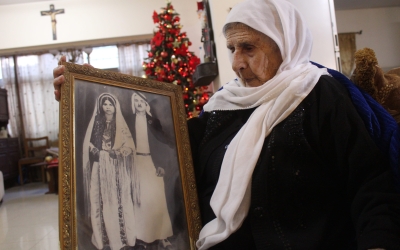
A local choir sang carols and the Catholic church laid on dances in a celebration touched with religious solemnity.
Aboud’s Christmas festivities traditionally begin on 16 December – the date of the martyrdom of Saint Barbara, the village’s patron saint.
Villagers told me that Saint Barbara was an early convert to Christianity. The daughter of a rich pagan, one story goes that she fell in love with a Christian and converted.
When she later confided in her father he was furious and tried to kill her, but Saint Barbara escaped to a cave in a hill which overlooked the town. There she hid until a shepherd betrayed her whereabouts and she was murdered.
The celebrations began in the village’s Greek Orthodox church, dating back to Byzantine era and one of the oldest churches still in use anywhere in the world.
I joined worshippers praying for the saint in a ceremony supervised by an archbishop in the Greek Orthodox church, Atallah Hanna.
When prayers were over, we moved in procession through the village and up the hill where Saint Barbara is believed to have been martyred.
Leading the way was a troop of uniformed scouts from the Roman Catholic church playing bagpipes and beating drums. Muslims joined our procession.
When we reached the tiny cave where she is said to have died, we entered in small groups. When my turn came I clambered in, lit a candle, and prayed to Saint Barbara for peace. It was a sacred moment.
The sun was setting as I emerged but there was still a fabulous view across rolling hills towards Tel Aviv and the sea.
Christians and Muslims
Most of Aboud falls inside Area C of the West Bank, which remains directly under Israeli military rule.
Land has been confiscated from villagers to make way for the nearby settlement of Beit Aryeh-Ofarim. Seventeen years ago Israeli forces dynamited the hilltop shrine, though it has since been restored.
'In our holidays they come to us and congratulate us, and in their holidays we go and congratulate them. We are all human beings'
- Rida, shopkeeper, Aboud
A Christian shopkeeper, Rida, told me that the 2,500 or so villagers who live in Aboud are split roughly half and half between Muslims and Christians, adding that they all “live like brothers”.
He added: “In our holidays they come to us and congratulate us, and in their holidays we go and congratulate them. We are all human beings.”
A Muslim merchant from a neighbouring family, Maiser, standing beside him stated: “I can confirm that is true. We live as brothers.”
After we had prayed to Saint Barbara, I followed the procession back down the hill to the town hall for singing, dancing and speeches. A teacher at the local school, acted as my guide and interpreter.
“We are one people who share the same circumstances and equal suffering,” he told me.
The choir sang carols, while the Catholic church laid on dancing by young people wearing the Keffiyah. There was a rendition of the Palestinian national anthem.
At the end Archbishop Hanna gave a resonant sermon in which he told us that Saint Barbara had died to “convey the message to live your faith and be honest with others”.
He then announced that we would go and light the Christmas tree “as one Palestinian family, Christian and Muslim. The message of Christmas for us is give us justice and peace and there can be no peace without justice.”
We surged out into the street. The Christmas tree was lit, and there followed more singing and fireworks.
In many parts of the world Christmas has become a festival of consumerism rather than faith. But in Aboud, the celebrations remained firmly rooted in Christian preaching and beliefs.
Christians believe that Jesus came into the world to help the poor, the weak and those suffering from injustice, and for Palestinian Christians that is a message that still resonates.
As I left Aboud, I felt I had been overwhelmingly privileged to have taken part in something that will stay a precious memory with me all my life. Events such as this show that Palestinian Christianity shines a light which must never be allowed to die.
Middle East Eye delivers independent and unrivalled coverage and analysis of the Middle East, North Africa and beyond. To learn more about republishing this content and the associated fees, please fill out this form. More about MEE can be found here.


